

ConScript Unicode Registry. Ardalambion. Chris Pound's Name Generation Page. Credits, etc. If you're intrigued by all of this, subscribe to the world-design mailing list via majordomo@erzo.org . I think Majordomo wants you to say "subscribe world-design [address]" in the body of the message. Or, maybe you'd prefer the constructed-languages list. Tell majordomo@diku.dk to "subscribe conlang". Have fun ! How to create a language. [All the pages of How to create a language can be downloaded for offline browsing in a .zip file.
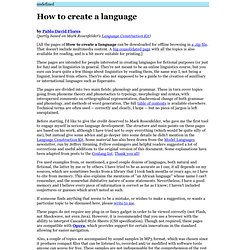
That doesn't include multimedia content. Richard Kennaway's Constructed Languages List. Last updated 7 January 2005.
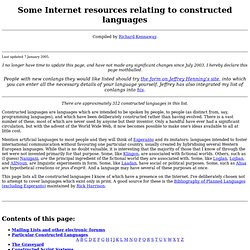
I no longer have time to update this page, and have not made any significant changes since July 2003. I hereby declare this page mothballed. People with new conlangs they would like listed should try the form on Jeffrey Henning's site, into which you can enter all the necessary details of your language yourself.
Ranto (JBR AntiZamenhofism) Learn Not to Speak Esperanto has moved into this ToC-ified subdirectory to allow more room for appendices.
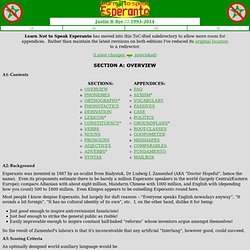
Rather than maintain the latest revisions on both editions I've reduced its original location to a redirector. (Latest changes. Untitled. Language Creation Society. Zompist recommends - Almeopedia. From Almeopedia Some books I've found inspiring, helpful, or amusing.
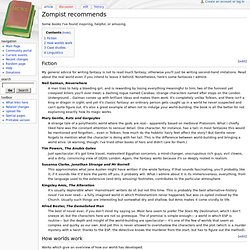
Fiction My general advice for writing fantasy is not to read much fantasy; otherwise you'll just be writing second-hand imitations. When do people learn languages? By now, I think, the positive content of this paper will be anticlimactic: Languages take immense effort to learn, and people will only learn them if it's socially or economically inescapable.
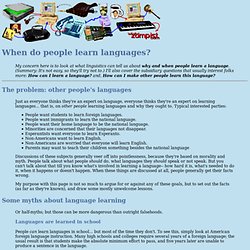
To put it another way: the way children learn or don't learn languages, as reviewed in the last section, holds for adults as well-- compounded by adults' lack of the special advantages of children (time, motivation, peer pressure). So what makes learning inescapable? Again, we can learn from the children. Mere opportunity isn't enough. Numbers in Over 5000 Languages. Compiled by the irrepressible Mark Rosenfelder.

Additions and corrections welcome. By family Special collections Proto-languages only: perfect for the long-range comparison fan Million-speaker languages: the world's major languages The numbers in various writing systems, plus field notes on distinguishing various types of writing systemsRick Schellen's page of the numbers in over 400 Indo-European dialects.Jennifer Runner's page on common expressions in many languages. Language Information : notes on linguistic families, and a taste of ethnomathematics. Sources The Sources Page gives the sources for each language (and also lists languages I don't have, and connects the languages to other wide-scale classifications: Ruhlen, Voegelin & Voegelin, Campbell, and the Ethnologue).
Hou tu pranownse Inglish. © 2000 by Mark Rosenfelder Everybody agrees that English spelling is horrible. There have been almost as many proposals for spelling reform as there are rewrites of Esperanto. (Tellingly, there has been precisely one success in each category-- Noah Webster and Ido-- and neither caught on universally.) Most of these proposals spend their energy fixing what isn't broken. For instance, they search hard for clever new ways of spelling the ch sound-- even though ch does the job just fine in hundreds of languages.
Whenever the subject comes up, someone is sure to bring up all the words in -ough, or George Bernard Shaw's ghoti-- a word which illustrates only Shaw's wiseacre ignorance. The purpose of this page is to describe those rules-- to explain the system behind English spelling, the rules that tell you how to pronounce a written word correctly over 85% of the time. Yingzi. Also see the Belorussian translation provided by Fatcow.
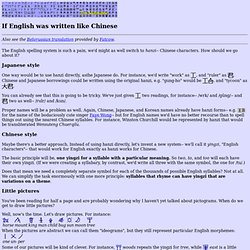
The English spelling system is such a pain, we'd might as well switch to hanzi-- Chinese characters. How should we go about it? Japanese style One way would be to use hanzi directly, asthe Japanese do. Sounds: The Sound Change Applier. This page describes a simple program which can apply a set of sound changes to a lexicon.
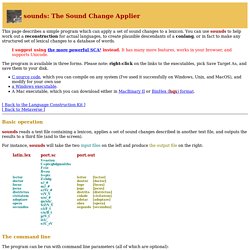
You can use sounds to help work out a reconstruction for actual languages, to create plausible descendants of a conlang, or in fact to make any structured set of lexical changes to a database of words. I suggest using the more powerful SCA² instead. It has many more features, works in your browser, and supports Unicode. The program is available in three forms. Please note: right-click on the links to the executables, pick Save Target As, and save them to your disk. C source code, which you can compile on any system (I've used it successfully on Windows, Unix, and MacOS), and modify for your own use a Windows executable. Basic operation sounds reads a text file containing a lexicon, applies a set of sound changes described in another text file, and outputs the results to a third file (and to the screen).
The command line The program can be run with command line parameters (all of which are optional): Zompist bboard.